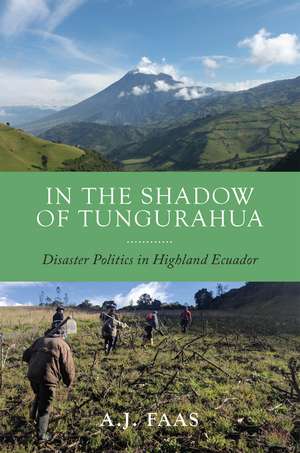In the Shadow of Tungurahua: Disaster Politics in Highland Ecuador
Autor A.J. Faasen Limba Engleză Hardback – 14 oct 2022
Preț: 911.22 lei
Preț vechi: 1012.07 lei
-10% Nou
Puncte Express: 1367
Preț estimativ în valută:
174.37€ • 186.45$ • 145.38£
174.37€ • 186.45$ • 145.38£
Carte indisponibilă temporar
Doresc să fiu notificat când acest titlu va fi disponibil:
Se trimite...
Preluare comenzi: 021 569.72.76
Specificații
ISBN-13: 9781978831575
ISBN-10: 1978831579
Pagini: 246
Ilustrații: 113 b&w illustrations
Dimensiuni: 156 x 235 x 20 mm
Greutate: 0.46 kg
Editura: Rutgers University Press
Colecția Rutgers University Press
ISBN-10: 1978831579
Pagini: 246
Ilustrații: 113 b&w illustrations
Dimensiuni: 156 x 235 x 20 mm
Greutate: 0.46 kg
Editura: Rutgers University Press
Colecția Rutgers University Press
Notă biografică
A.J. FAAS is an associate professor of Anthropology at San José State University.
Cuprins
Preface
Prologue – Fire on The Mountain
Introduction – Reframing Disaster
Part I – Mobility and Legibility
Introduction
Chapter 1 – Mobilities & (Re)Settlements
Chapter 2 – Archipelagos and Bare Life
Chapter 3 – The Production of Space
Chapter 4 – The Four Walls of Bare Life
Part II – The Palimpsest of Minga
Introduction
Chapter 5 – Enduring Cooperation
Chapter 6 – Institutions
Chapter 7 – El Indigno, El Truco, El Chisme, Y El Adelanto
Part III – Recoveries
Introduction
Chapter 8 – “But We Did It”
Epilogue – Convivir
Acknowledgments
Notes
References
Index
Prologue – Fire on The Mountain
Introduction – Reframing Disaster
Part I – Mobility and Legibility
Introduction
Chapter 1 – Mobilities & (Re)Settlements
Chapter 2 – Archipelagos and Bare Life
Chapter 3 – The Production of Space
Chapter 4 – The Four Walls of Bare Life
Part II – The Palimpsest of Minga
Introduction
Chapter 5 – Enduring Cooperation
Chapter 6 – Institutions
Chapter 7 – El Indigno, El Truco, El Chisme, Y El Adelanto
Part III – Recoveries
Introduction
Chapter 8 – “But We Did It”
Epilogue – Convivir
Acknowledgments
Notes
References
Index
Recenzii
"A. J. Faas masterfully presents the stories of residents who were affected by the 1999 and 2006 volcanic eruptions of Tungurahua in the Sierra of central Ecuador [and] provides valuable insight into the politics of disasters. The accounts and experiences of the people of Penipe following the eruption and during their resettlement are powerful, and readerswill quickly feel transported to the streets, porches, agricultural fields, and communal buildings where these events unfolded."
"Tungurahua is a volcano that erupted ten years before Faas completed his fieldwork in Penipe...[L]ike the volcano, Faas’s In the Shadow of Tungurahua is similarly potent due to the scope of its scholarly interventions, for how it brings together the anthropologies of work, risk, and disaster. It is also potent for how it keeps the ethnographic encounter front and center, which breathes life into the text."
"In the Shadow of Tungurahua, by A.J. Faas, is a frame story, a structure that allows a rich tapestry of place-based stories to unfold...Faas understands the present situation of people responding to disaster not as an unexpected development but a manifestation of centuries of social and political activity in a place permanently plagued by conquest and resistance – but it is anything but simplistic."
"Tungurahua is a volcano that erupted ten years before Faas completed his fieldwork in Penipe...[L]ike the volcano, Faas’s In the Shadow of Tungurahua is similarly potent due to the scope of its scholarly interventions, for how it brings together the anthropologies of work, risk, and disaster. It is also potent for how it keeps the ethnographic encounter front and center, which breathes life into the text."
"In the Shadow of Tungurahua, by A.J. Faas, is a frame story, a structure that allows a rich tapestry of place-based stories to unfold...Faas understands the present situation of people responding to disaster not as an unexpected development but a manifestation of centuries of social and political activity in a place permanently plagued by conquest and resistance – but it is anything but simplistic."
"In the Shadow of Tungurahua is a powerful reminder of ethnography’s analytical and methodological value in the anthropological study of disasters. Weaving theoretical reflections with ethnographic storytelling, Faas examines the ways people work tirelessly to make meaningful lives in catastrophe’s aftermath and how disaster affected communities are often haunted by colonial and post-colonial political ecological processes that engender disasters. Books like this are few and far between."
"This book demonstrates how deeply an anthropological eye can probe when guided by solid theory, methodology, and long and careful fieldwork. A.J. Faas makes a transformative contribution to the study of disasters and politics in Ecuador, Latin America, and the Global South. It’s a delightful read, rich in ethnographic detail and engaging prose, and a testament to the value of anthropological approaches to the study of disaster."
Descriere
In the Shadow of Tungurahua is about villagers learning to co-live with an active volcano while adapting to disasters largely produced by a protean state’s attempts to settle and govern its rural margins. It’s also about people responding creatively to cooperate, confront hardships, and craft new futures through locally derived disaster recovery projects and politics.
